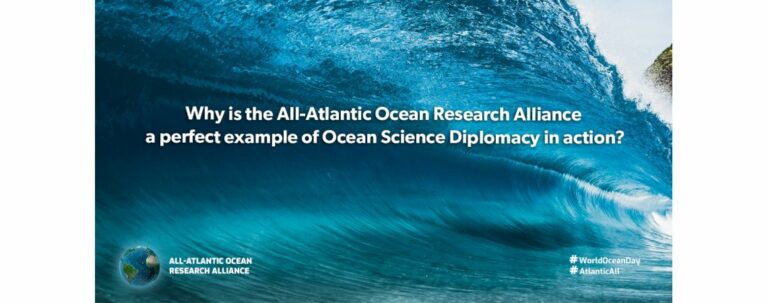June 8th is World Ocean Day, declared in 2008 by the United Nations General Assembly. To celebrate this day, we would like to share more about ocean science diplomacy, a very important practice of which the All-Atlantic Ocean Research Alliance is a perfect example.
Polejack (2021) states in his article that science diplomacy encompasses the multitude of processes that interact between science and international relations dealing with global, cross-border, and regional issues of common concern [1]. Practices of science diplomacy include, for example, the provision of scientific evidence to international decision-making processes; the enhancement of relations between nations with political tensions through the establishment of joint research projects; and scientific-technical cooperation to address the challenges of humanity [1], [2]. Science diplomacy aligns political agendas with community interests, by giving researchers a central role and allowing them to contribute to evidence-based joint decision-making processes [3].
According to Polejack (2021) “science diplomacy research can promote better coordination and transdisciplinary science in global ocean affairs. Ocean science diplomacy can also ensure the conduct of more effective equitable negotiations and the attainment of fair agreements between States and other entities, including international organizations, by balancing national interests with regional and global shared goals. Understanding past negotiations in ocean affairs can help us shape future scenarios where science and international relations leverage expertise and scientific capacity to inform transnational decision making. Ocean science diplomacy will be essential in advancing coordination of the necessary elements needed to overcome historical difficulties” [3].
The All-Atlantic Ocean Research Alliance involves countries from both sides of the Atlantic Ocean which aims at enhancing marine research and innovation cooperation along and across the Atlantic Ocean, from the Arctic to Antarctica. This is an example of science diplomacy, for the following reasons [4]:
(i) scientific advice supported the process of the three international instruments (North–North—The Galway Statement, South–South: The Framework, and South–North: The Belém Statement), identifying priority areas and targeted countries.
(ii) official documents supporting the Alliance, i.e., bilateral and multilateral agreements, foster research projects and access to infrastructure.
(iii) science-based dialog is bridging countries in the Atlantic around the common goal of societal benefit. This dialog is set in both the existing diplomatic instruments, as well as in the funded research projects.
According to Gluckman et al. (2018), science diplomacy addresses goals shaped by national interests and needs; cross-border interests; and global needs [5]. Polejack et al. (2021) reports that the All-Atlantic Ocean Research Alliance uses science diplomacy to address goals shaped by similar interests. First, the Alliance was triggered by national interests, in particular the Commission’s interests in internationalizing its Atlantic Strategy. Second, the stepwise process of implementing the Alliance covers cross-border interests ranging from North–North and South–South coalitions to a whole basin coordination. Lastly, the aims of the Alliance cover global ocean community interests [4].
Remember: World Oceans Day is celebrated on June 8! “Revitalization: collective action for the ocean” is the theme for 2022, a year framed by the UN Decade of Ocean Sciences and the celebration of the Oceans 2022 Conference, two years after it was cancelled due to the pandemic.
References:
[1] A. Polejack, “MENTALIDADE MARÍTIMA – o progresso do direito do mar sob a ótica de pesquisadores brasileiros,” HaÌ Direito do Mar sem Ciência? A Diplomacia CientiÃŒÂÂfica no Oceano, 2021.
[2] A. Rungius, C., Flink, T., & Degelsegger-Márquez, “S4D4C’s State-of-the-Art Report on Science Diplomacy,” 2018.
[3] A. Polejack, “The Importance of Ocean Science Diplomacy for Ocean Affairs, Global Sustainability, and the UN Decade of Ocean Science,” Front. Mar. Sci., vol. 8, no. March, 2021, doi: 10.3389/fmars.2021.664066.
[4] A. Polejack, S. Gruber, and M. S. Wisz, “Atlantic Ocean science diplomacy in action: the pole-to-pole All Atlantic Ocean Research Alliance,” Humanit. Soc. Sci. Commun., vol. 8, no. 1, 2021, doi: 10.1057/s41599-021-00729-6.
[5] K. T. Gluckman PD, Turekian VC, Grimes RW, “Science diplomacy: a pragmatic perspective from the inside. Science & Diplomacy.” 2018.
by SPI (AANChOR partner)

